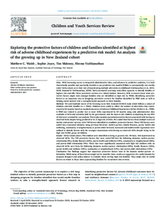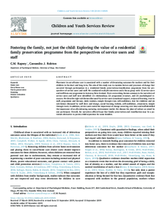Displaying 31 - 40 of 70
This article provides a historical context and describes numerous provisions of the family group conference that protect participants and the proceedings. It then describes applications of FGC‐like approaches in the United States where practice models and policies—not laws—guide the implementation of such approaches.
Vulnerability has been a guiding narrative to state interventions towards children and their families in New Zealand. This article shows how this progressive notion has been systematically managed to fit pre-established political and policy priorities.
This chapter from the Routledge Handbook of Family Law and Policy examines how permanency for children is achieved in New Zealand in the child protection context.
The present review addressed the research question What evidence is there that parenting interventions conducted with parents who maltreat their children, reduce the incidence of further child maltreatment?
The aim of this study was to identify what protective factors might exist amongst families who are identified as high risk by predictive risk models (PRMs).
This chapter from the book Education in Out-of-Home Care reports on a qualitative doctoral study that investigated the experiences of New Zealand care leavers who went to university.
Drawing on interviews and focus groups with child protection social workers from three site offices in Aotearoa New Zealand (interviews, n = 26; focus groups, n = 25) and using thematic analysis, this study identified the case, internal organisational, inter-site organisational and external elements that contributed to threshold decisions.
The aim of this study was to examine factors and processes of change that occurred through participation in a residential family preservation/reunification programme from the perspectives of service users and staff.
In this study, the authors analyse a child protection services dataset that includes a network of approximately 5 million social relationships collected by social workers between 1996 and 2016 in New Zealand to test the potential of information about family networks to improve accuracy of models used to predict the risk of child maltreatment.
"Maori groups in New Zealand are taking to the streets to protest family separations carried out by the child welfare agency and a planned development on their ancestral lands," according to this article from CNN.


